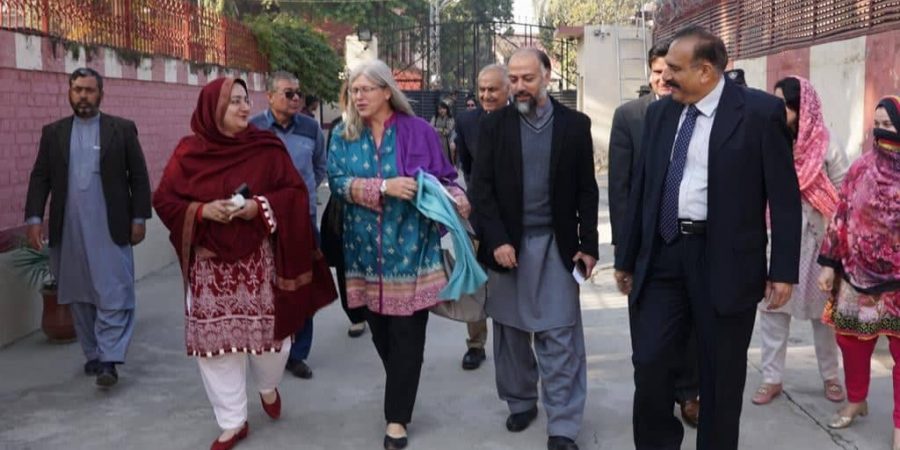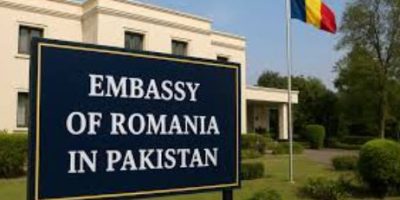Canadian mission partners with Wali Khan Varsity to offer Reel Film screening

MARDAN, DEC 10 (DNA) -The High Commission of Canada collaborated with Abdul Wali Khan University in Mardan, Khyber Pakhtunkhwa (KP), to offer an exclusive screening as part of the Human Rights Reel Film Festival, taking place in 10 cities across Pakistan. This was the first time that a film from the Festival has been shown in Mardan.
The festival is organized by the European Union (EU) and the United Nations (UN) in collaboration with sixteen EU and UN member states, as well as educational and cultural institutions across Pakistan, to mark 16 days of Activism against gender based violence.
The Canadian documentary film “The Boxing Girls of Kabul” touches on themes of women’s empowerment and gender roles.
The film follows three young women boxers and their coach at Afghanistan’s female boxing academy, as these athletes confront many challenges in their efforts to represent their country in international competition and attempt to qualify for the 2012 Olympic Games.
The High Commissioner of Canada Wendy Gilmour, and Member of the National Assembly Shaheen Naz Saifullah from Mardan were the guests of honour at the event, and made remarks following the film screening.
“It is a fundamental human right that women and girls should have the same access to education, sports and economic opportunities as their male counterparts,” said High Commissioner Wendy Gilmour. “When women are empowered, families and communities benefit”.
The High Commissioner thanked the staff and leadership of Abdul Wali Khan University in Mardan for hosting the film and discussion, and for highlighting the importance of respect for human rights in all endeavours.
Shaheen Saifullah encouraged male students to facilitate females in their family and circles of friends, not only to get higher education but in achieving their dreams.
She hoped that in future women would be able to achieve their goals in life with the support of their parents, brothers and husbands, stating “this is the only way forward for Pakistan to progress”.
Following the screening, students participated in a panel discussion with human rights activist and documentary filmmaker Samar Minallah Khan; the first anti-harassment Ombudsperson of Khyber P,akhtunkwa Dr Rukhshanda Naz; and, General Manager, Sports, at the Pakistan Cricket Board, Yahya Ghaznavi.
Ms. Khan, who is known for her special focus on highlighting women’s issues through digital media, spoke about the need for portraying a positive image of women in the media. “Film can play an important role in breaking the silence around human rights violations. It has the power to generate a discussion and bring about tangible solutions,” she said.
Ms. Naz talked about the need for proper labour laws to improve women’s economic empowerment. She explained, “empowering women workers in the informal economy is key to expanding their choices, improving their livelihoods and advancing gender equality. In recent years, the Federal and Provincial Governments have undertaken a number of initiatives to achieve the goal of gender equality through policy and legislative measures particularly for women in the workforce.
However, the labour of women is not represented accurately in government databases due to large numbers involved in the informal sector and in home-based and family business and, therefore, the recommendations in the Women Empowerment Policy 2017 are not being adequately reflected in the labour laws. This needs to change.”
Linking back to the theme of the documentary, Yayha Ghaznavi highlighted the role of Sport in promoting the rights of women and gender equality.
“There is no sport in the Olympics now which is competed by males alone, which signifies a positive trend with regards to opportunities for both men and women”, he remarked. “We have women competing in sports disciplines which were earlier male dominated, like boxing, weightlifting, and even Kabaddi”.=DNA
==============
Related News

Romanian Embassy to host Christmas Carols Concert in Islamabad
ISLAMABAD, DEC 15 /DNA/ – The Embassy of Romania has announced a special Christmas carolsRead More

IFWA elects Philippine envoy’s spouse as new vice president
ISLAMABAD, DEC 12 /DNA/ – The Islamabad Foreign Women’s Association (IFWA) elected last 08 DecemberRead More


Comments are Closed